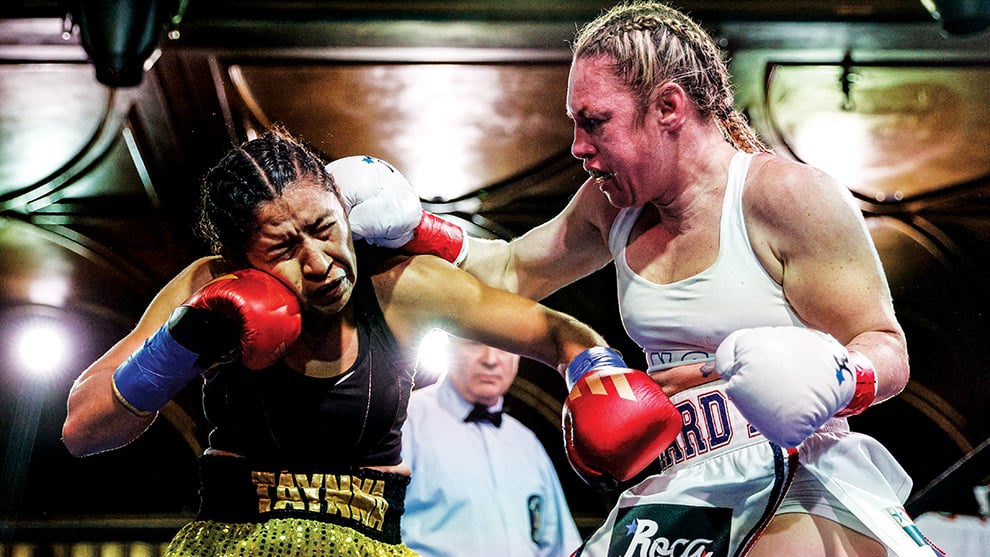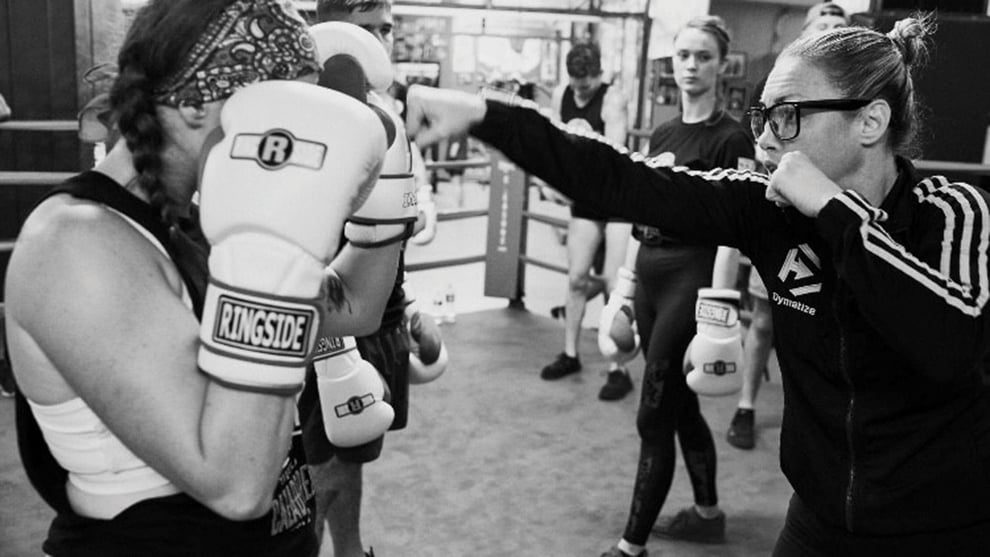Mark Baldwin
MAYBE I’ve been in denial all these years. Or maybe I just ignored the obvious and continued regardless for my own convenience. I never seriously thought about asking why I love boxing so much. Thoughts popped up for a while, trying to justify why I was watching this. Why am I writing about this? I know what this sport can do. It’s always been like this.
I’m old enough to remember artists like Bradley Stone, Michael Watson, Gerald McClellan, Johnny Owen, Steve Watt and James Murray. I could go on. Sports victims in different ways. I never forgot them. How could anyone forget what he did for our entertainment? Entertainment? The price they and many others paid certainly cannot be forgotten.
I would love to interview Donald Curry, Thomas Hearns and tons of other players from this truly amazing era. But I can’t. I just can’t. Curry, Hearns and many others have been destroyed by this sport.
Now I look at this sport differently. I shudder when I look at Derek Chisora. I can’t enjoy his last ride. People cheer more. But do they really want more? Are they really unaware of what potentially awaits them? Is it more accurate to say that a screaming mob that demands blood and courage for its entertainment doesn’t really care about what awaits them? They would have stopped investing in their emotions a long time ago if and when the news came out that all the doomsday scribes were right. Until then, another round of warriors will be served for their entertainment.
I read “Damage” by Tris Dixon, an extremely difficult and in-depth analysis of the effects of chronic traumatic encephalopathy (CTE) in sports. A book that should be read by everyone involved in this sport. Dixon beyond education with carefully chosen words.
Truth be told, I didn’t need to read it. I already knew what Dixon would write. What would he say? How can you really not know what being hit in the head repeatedly does to someone. But maybe I’ve been subconsciously blocking out the dangers over the past few years. It was probably easier on my conscience. Dixon reminded me of many things. But one of the players said a few words that I will never forget.
I have previously avoided touching on this sensitive topic. But Heather Hardy was different. I wanted to talk to her. I wanted to tell her story. I wanted to know her story. Hardy is another victim of the sport. She fought twenty-seven times as a professional boxer. She also absorbed punches and kicks in MMA and kickboxing. He is forty-two years old and currently retired. However, her biggest fight is yet to come. The biggest fight of her life. Probably one that has no chance.
“Do I regret it? No,” Hardy told me when we connected via Zoom. “I don’t regret anything in my life. Boxing made me who I am. I love my career. I love everything I’ve done. I’m at a crossroads right now. My whole life is over and I’m hurt. Think about it. I gave everything to boxing.”

NEW YORK, NEW YORK – FEBRUARY 23: Taynna Cardoso of Brazil (black shorts) trades blows with Heather Hardy (white shorts) during their super featherweight bout during BoxingInsider Fight Night at Sony Hall on February 23, 2023 in New York City. Hardy won by majority decision. (Photo: Sarah Stier/Getty Images)
Hardy is right. She gave everything to boxing. Literally. Hardy cried during our 20 minutes on Zoom. In fact, she cried a lot. Her retirement is out of reluctance. Forced removal from sports. You feel like Heather Hardy would fight forever if she could. Hardy didn’t want to retire. She couldn’t afford to retire. There was even a fight without gloves set. The brutality of the world of bare legs could be her next step. I shudder again when I think of what it could have done to her.
“I couldn’t afford to retire early,” Hardy said as tears flowed again. “You think I wanted to fight Amanda Serrano twice? No way. People said you’re 42, of course you have to retire, you have brain damage. I had a bare-knuckle world title fight on the table for $50,000, which was the money I needed.
Every word Hardy said mattered. There were consequences. Nothing I said compared to these things. Every question. Every word felt clumsy and awkward. Even pushy. Then my thoughts wandered to what Hardy must have felt as he had to tell his sad story once again.
“When you have a concussion, that part of your brain dies, and I can’t afford any more dead things,” Hardy added.
“They said as long as I didn’t get hit in the head any more it wouldn’t get any worse. But they don’t know how much brain I’ve lost. They can’t tell you until you die. An already difficult job interview became even more uncomfortable. Thoughts turned to the future Hardy had ahead of him.
“I gave everything and no one is helping me now,” Hardy said, clearly thinking the exact same thing.
“I love boxing and I truly believe that boxing saves lives. I saw people I loved die in the ring, but I saw how many lives it saved, including mine. I don’t regret anything. I wouldn’t do anything else.”
Maintaining love for a sport that has taken so much is extraordinary. Shocking even in many respects. A photo of Patrick Day, a player who not so long ago paid the ultimate price for his craft, is always close by.
“I felt nauseous. My weight dropped to 115 pounds. I spent days without sleep. I just melted. The hardest thing for me was to admit that I was too weak to fight. Hardy talks about why she had to sit out after her second fight with Amanda Serrano last year. The effects of what Serrano had done to her had lingered for too long. They never left. They may never go away.
“The risk we take is the price we have to pay for success, and we factor it into the budget.” Barry McGuigan once said. But I wonder if, for most of us, a budget really means no. This is certainly a solution for paying players who are too easily booed when they see a bit of sweet science. Most want something different for their money. Something much more brutal. A little piece of chaos that can be replayed over and over again on social media. They bragged to their friends that they were there in person and witnessed some poor soul being beaten into submission.
They say make money and get out. But how can you get out if you don’t make enough money to get out. Trapped in a vicious carousel with no exit, Heather Hardy found herself on this playground. She didn’t leave of her own free will. It threw her out when it took everything. High price of entry. A price that just kept going up. This went well beyond the call of duty.
Hardy needs our help. Sport should slow down a bit. But that won’t happen. This is never the case. But maybe that time has passed. If sports had provided her with a more decent salary, Hardy might have walked away with enough money to live comfortably in retirement. And with her health.
“I wish they would have paid me more money so that, being undefeated and world champion, I wouldn’t have had to go to MMA. Every time I went in there I was fighting for my life. I got into debt trying to keep my daughter in school. I cried out for equal pay and no one listened. Now look at me. I dedicated my whole body to boxing. I can’t even drive because I can’t see.
Hardy now coaches players. She is extremely cautious of the warriors under her care. Sparring is controlled. This is limited. He knows that a large percentage of damage occurs in the gym. Hardy worries that more female athletes will have the same problems she did in the coming years.
“Women’s boxing is certainly still in its infancy, but it is now at its most dangerous because girls are taking part in tough, competitive fights, risking their lives, but are not being taken care of financially.”
Hardy has difficult times ahead. She knows it better than anyone else. But Hardy will keep fighting. A born warrior in every respect. We forget that Hardy was once a world champion. She reached the top of her sport. But in many ways, the sport had failed her. And wrong. He receives no pension for his efforts. It’s just a story of broken promises and hopes of wealth long since extinguished.
Now I look at this sport differently. I’m at the age where I have to. My heroes from the end of the last millennium have moved on. In many cases it did not end well. I often think about those who are still with us, what kind of life they lead now. Shattered dreams. Broken bodies. The hard-earned money is long gone. The hangers didn’t stick. They went with the money. How many of them still remember their prime numbers? Do these fighters even remember their prime?

Heather Hardy teaches Meg Lazar boxing
Players from that generation were watched from the comfort of a couch. Stumbling and falling into the world of boxing media changes a lot. Now I know some of these proud, brave warriors on a personal level. An emotional investment that completely changed my perspective. I still love this sport. But I know that hypocrisy goes hand in hand with this love.
This month I was ringside at Barnsley enjoying what Stevie McKenna and Joe Laws were serving up. A brutal war that you didn’t dare look away from. But the next time I watch any of these players, I’ll think about what lies ahead. The body can only handle so much. My conscience too.
Heather Hardy’s story needs to be told. It’s too late for her. However, lessons can be learned from her difficult situation. Let’s hope that now there will be empathy and help. But her story should serve as a warning to every warrior. Get out while you can
#Heather #Hardys #Toughest #Fight #Boxing #news